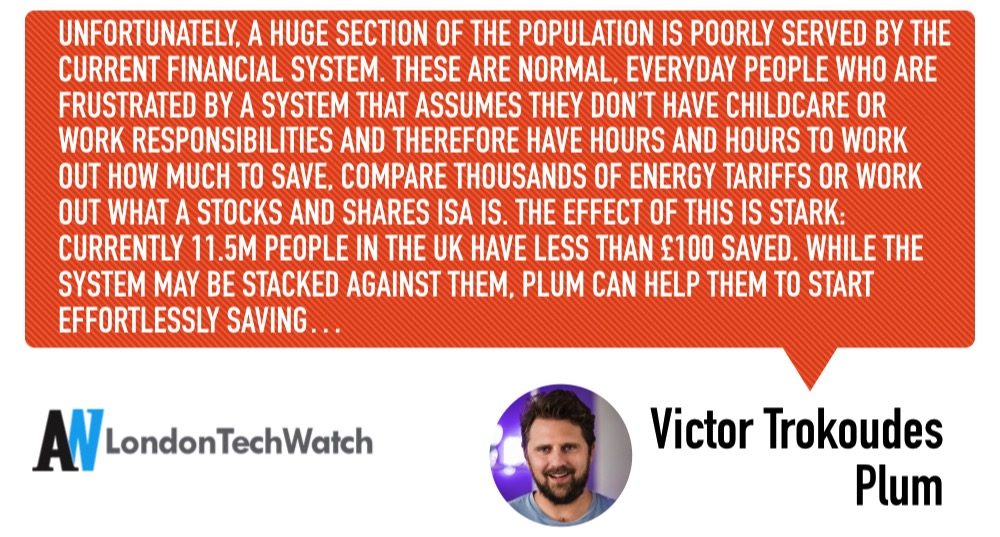Spending money is easy, but saving money is hard. Plum, the AI assistant that analyses users’ income and spending patterns, calculates the ideal savings amount and automatically sets it aside. While users can withdraw money from Plum at any time, they also have the option to invest that money in themed funds at various risk levels. This investment option is accessible through the Plum Plus subscription model, which costs only £1 per month. Over 500,000 people are already using Plum.
LondonTechWatch spoke with Plum CEO and Cofounder Victor Trokoudes to learn more about Plum’s recent activity which includes the launch of its Android App, Plum Pro, and the company’s recent round funding which brings its total funding raised to $10.5M across five rounds.
Who were your investors and how much did you raise?
This was $3M additional funding, following on from a $4.5M raise in May 2019. The investors are VentureFriends, EBRD (the European Bank for Reconstruction and Development) and Christian Faes, CEO of LendInvest.
 Tell us about the product or service Plum offers.
Tell us about the product or service Plum offers.
Plum is an AI assistant that boosts your bank balance. It works by using automation to save and invest in a personalised way, helping over 500,000 people in the UK to be better off.
Plum connects to UK bank accounts and analyses income and spending patterns. It calculates the perfect saving amount, which is set aside automatically every couple of days. This money can then be invested in themed funds, designed to suit both first-timers and experienced investors. Plum also looks for better deals on bills and utilities and allows you to switch in seconds. The goal is to make users £186K better off over their lifetime.
What inspired the start of Plum Fintech?
Alex and I both had successful careers in London. Yet we both felt unable to save any money each month. We set ourselves a challenge to see who could save the most in just a month. I studied economics so I focused on using traditional budgeting methods. Meanwhile, Alex, a skilled engineer, built an algorithm that would save automatically, with no need for a budget. When we compared savings at the end of the month, Alex had double the money I did. We realised that people around the country were struggling to budget, just as we had, and technology could be the answer for the 140M people in the EU that have no savings at all. We decided to build an AI assistant that could auto-save and help people grow their money, just as Alex had been able to do, and Plum was born.
How is Plum different?
Most other money management apps are designed to help you budget more easily – however, doing a budget is no guarantee that you will actually stick to it! Automation has been shown to be more effective in helping people save more, without even noticing. Alternatives to Plum tend to focus on either providing more information in the hope this will help users to make better decisions or iterating existing financial products. Plum goes an important step further because every feature we roll out is designed to make financial decisions easier through personalised automation. There is no other company taking this holistic and empowering approach.
What market are you targeting and how big is it?
Anyone who is struggling to save or manage their money will find Plum useful. Unfortunately, a huge section of the population is poorly served by the current financial system. These are normal, everyday people who are frustrated by a system that assumes they don’t have childcare or work responsibilities and therefore have hours and hours to work out how much to save, compare thousands of energy tariffs or work out what stocks and shares ISA is. The effect of this is stark: currently, 11.5M people in the UK have less than £100 saved. While the system may be stacked against them, Plum can help them to start effortlessly saving and building their wealth so they are ready for whatever the future holds.
Who do you consider to be your main competitors?
There aren’t any direct competitors that do exactly what Plum does in terms of saving, switching and growing money. Chip is one app that does personalised auto-saving, Cleo is a chatbot that focuses on spending analysis, and there are also investment-focused apps like Moneybox and Nutmeg which have some similar features to Plum. However, none offer the same holistic approach to saving that Plum has.
What’s your business model?
Plum currently has a subscription service called Plum Plus, costing £1 p/m. This subscription covers access to a range of investment funds (as many as the user would like to add), alongside a number of other features which we are adding progressively as we grow. Plum Plus allows us to keep our business sustainable while ensuring our core saving product remains accessible to everyone. At a price of just £1 a month, it is a low enough price to be competitive and attractive for lower earners. Alongside this, we recommend better products to our users via our switching offering, which allows us to earn some commission from the supplier.
What was the funding process like?
Funding is always a tough process, but for us, it has been very rewarding. We needed to have lots of conversations to find something that worked, but the most important thing was to find people who are sold on the future of the company.
What are the biggest challenges that you faced while raising capital?
The biggest challenge is raising capital alongside running the actual business full time. And time itself; if only there was more of it.
The biggest challenge is raising capital alongside running the actual business full time. And time itself; if only there was more of it.
What factors about your business led your investors to write the check?
For us, it was two things in particular: the big vision and traction so far.
What are the milestones you plan to achieve in the next six months?
We have just launched the Android version of our app, so we’re building our Android team right now to ensure the app grows at the same pace as iOS. We are also planning the launch of a new subscription service called Plum Pro, which will offer intelligent and intuitive saving features that are directly informed by behavioural science. Looking ahead to later on in 2020, we want to bring our solution across the channel to European savers.
What advice can you offer companies in London that do not have a fresh injection of capital in the bank?
When you need the capital, get ready, go out there, and secure it!
Where do you see the company going now over the near term?
We want to keep saving and growing people’s income in more and more ways. One thing that is particularly exciting us right now is bill switching, which we are expanding in the product. We are also looking forward to bringing Plum to other European countries in the near future.
What is your favorite restaurant in London?
Blacklock.





